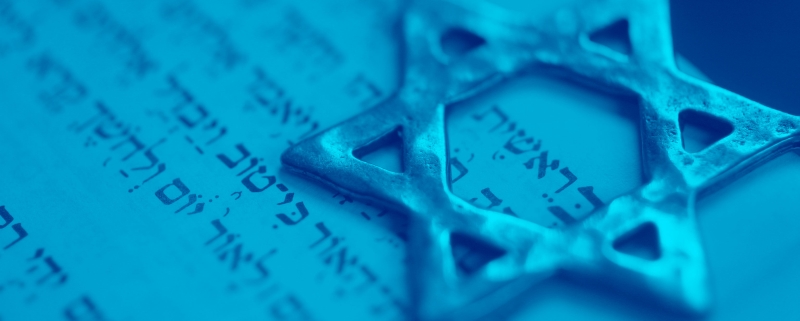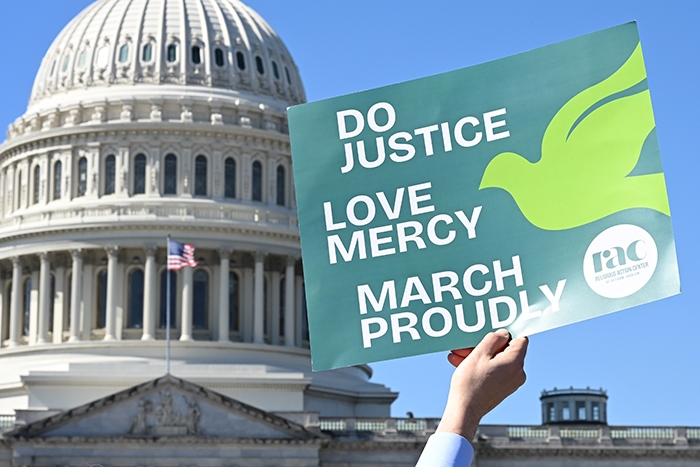This letter was written by the 17 rabbis who were arrested in 1964 in St. Augustine, FL for assembling in an integrated group as a protest against racial segregation, discrimination, and violence.
June 19, 1964
Dear Friend:
St. Augustine is the oldest city in the United States. It was here on St. Augustine’s Day, August 28, 1565, that Pedro Menendez de Aviles first sighted land. In 1965 it will celebrate its 400th anniversary – indeed it has requested federal funds to enhance this historic observance. St. Augustine has other distinguishing characteristics. In American history books yet to be written, this small, neatly kept Florida community will long be remembered as a symbol of a harsh, rigidly segregated, Klan- dominated, backward-looking city which mocked the spirit of the doughty African-born, dark- pigmented priest for whom it was named.
St. Augustine is a tourist town. By far the highest percentage of its income comes from the visitors who walk through its quaint streets staring at “excavations” from the 18th century only now being restored. Most visitors stop at the Slave Market, supposedly only a relic of bygone days. True, they no longer sell slaves in that market, but let no one be deceived into thinking that there no longer exists among this town’s white residents the mental attitude and the psychology which first put slaves on those trading blocks. The spirit of racial arrogance persists and is reinforced by the sway of terror long exerted by hooded and unhooded mobsters.
We went to St. Augustine in response to the appeal of Martin Luther King addressed to the CCAR Conference, in which he asked us to join with him in a creative witness to our joint convictions of equality and racial justice.
We came because we realized that injustice in St. Augustine, as anywhere else, diminishes the humanity of each of us. If St. Augustine is to be not only an ancient city but also a great-hearted city, it will not happen until the raw hate, the ignorant prejudices, the unrecognized fears which now grip so many of its citizens are exorcised from its soul. We came then, not as tourists, but as ones who, perhaps quixotically, thought we could add a bit to the healing process of America.
We were arrested on Thursday, June 18, 1964. Fifteen of us were arrested while praying in an integrated group in front of Monson’s Restaurant. Two of us were arrested for sitting down at a table with three Negro youngsters in the Chimes Restaurant. We pleaded not guilty to the charges against us.
Shortly after our confinement in the St. John’s County Jail, we shared with one another our real, inner motives. They are, as might be expected, mixed. We have tried to be honest with one another about the wrong, as well as the right, motives which have prompted us. These hours have been filled with a sense of surprise and discovery, of fear and affirmation, of self-doubt and belief in God.
We came to St. Augustine mainly because we could not stay away. We could not say no to Martin Luther King, whom we always respected and admired and whose loyal friends we hope we shall be in the days to come. We could not pass by the opportunity to achieve a moral goal by moral means – a rare modern privilege – which has been the glory of the non-violent struggle for civil rights.
We came because we could not stand quietly by our brother’s blood. We had done that too many times before. We have been vocal in our exhortation of others but the idleness of our hands too often revealed an inner silence; silence at a time when silence has become the unpardonable sin of our time. We came in the hope that the God of us all would accept our small involvement as partial atonement for the many things we wish we had done before and often.
We came as Jews who remember t he millions of faceless people who stood quietly, watching the smoke rise from Hitler’s crematoria. We came because we know that, second only to silence, the greatest danger to man is loss of faith in man’s capacity to act.
Here in St. Augustine we have seen the depths of anger, resentment and fury; we have seen faces that expressed a deep implacable hatred. What disturbs us more deeply is the large number of decent citizens who have stood aside, unable to bring themselves to act, yet knowing in their hearts that t his cause is right and that it must inevitably triumph.
We believe, though we could not count on it in advance, that our presence and actions here have been of practical effect. They have reminded the embattled Negroes here that they are not isolated and alone. The conscience of the wicked has been troubled, while that of the righteous has gained new strength. We are more certain than before that this cause is invincible, but we also have a sharpened awareness of the great effort and sacrifice which will be required. We pray that what we have done may lead us on to further actions and persuade others who still stand hesitantly to take the stand they know is just.
We came from different backgrounds and with different degrees of involvement. Some of us have had intimate experience with the struggle of minority groups to achieve full and equal rights in our widely scattered home communities. Others of us have had less direct contact with the underprivileged and the socially oppressed. And yet for all of us these brief, tension-packed hours of openness and communication turned an abstract social issue into something personal and immediate.
We shall not forget the people with whom we drove, prayed, marched, slept, ate, demonstrated and were arrested. How little we know of these people and their struggle. What we have learned has changed us and our attitudes. We are grateful for the rare experience of sharing with this courageous community in their life, their suffering, their effort. We pray that we may remain more sensitive and more alive as a result.
We shall not soon forget the stirring and heartfelt excitement with which the Negro community greeted us with full-throated hymns and hallelujahs, which pulsated and resounded through the church; nor the bond of affectionate solidarity which joined us hand in hand during our marches through town; nor the exaltation which lifted our voices and hearts in unison; nor the common purpose which transcended our fears as well as all the boundaries of race, geography and circumstance. We hope we have strengthened the morale of St. Augustine Negroes as they strive to claim their dignity and humanity; we know they have strengthened ours. Each of us has in this experience become a little more the person, a bit more the rabbi he always hoped to be (but has not yet been able to become). We believe in man’s ability to fulfill God’s commands with God’s help. We make no messianic estimate of man’s power and certainly not of what we did here. But it has reaffirmed our faith in the significance of the deed. So we must confess in all humility that we did this as much in fulfillment of our faith and in response to inner need as in service to our Negro brothers. We came to stand with our brothers and in the process have learned more about ourselves and our God. In obeying Him, we become ourselves; in following His will we fulfill ourselves. He has guided, sustained and strengthened us in a way we could not manage on our own. We are deeply grateful to the good influences which have sustained us in our moments of trial and friendship. Often we thought of parents, wives, children, congregants, particularly our teen-age youth, and of our teachers and our students. How many a Torah reading, Passover celebration, prayer book text, and sermonic effort has come to mind in these hours. And how meaningful has been our worship, morning and evening, as we recited the ancient texts in this new, yet Jewishly familiar, setting. We are particularly grateful for what we have received from our comrades in this visit. We have been sustained by the understanding, thoughtfulness, consideration and good humor we have received from each other. Never have the bonds of Judaism and the fellowship of the rabbinate been more clearly expressed to us all or more deeply felt by each of us.
These words were first written at 3:00 a.m. in the sweltering heat of a sleepless night, by the light of the one naked bulb hanging in the corridor outside our small cell. They were, ironically, scratched on the back of the pages of a mimeographed report of the bloody assaults of the Ku Klux Klan in St. Augustine. At daybreak we revisited the contents of the letter and prayed together for a new dawn of justice and mercy for all the children of God.
e do not underestimate what yet remains to be done, in the north as well as the south. In the battle against racism, we have participated here in only a skirmish. But the total effect of all such demonstrations has created a Revolution; and the conscience of the nation has been aroused as never before. The Civil Rights Bill will become law and much more progress will be attained because this national conscience has been touched in this and other places in the struggle.
We praise and bless God for His mighty acts on our behalf.
Baruch ata adonai matir asurim. Blessed art Thou, O Lord, who freest the captives.
Rabbi Eugene Borowitz
Rabbi Balfour Brickner
Rabbi Israel "Sy" Dresner
Rabbi Daniel Fogel
Rabbi Jerrold Goldstein
Rabbi Joel Goor
Rabbi Joseph Herzog
Rabbi Norman Hirsh
Rabbi Leon Jick
Rabbi Richard Levy
Rabbi Eugene Lipman
Rabbi Michael Robinson
Rabbi B. T. Rubenstein
Rabbi Murray Saltzman
Rabbi Allen Secher
Rabbi Clyde T. Sills
Mr. Albert Vorspan
Explore Jewish Life and Get Inspired
Subscribe for Emails

